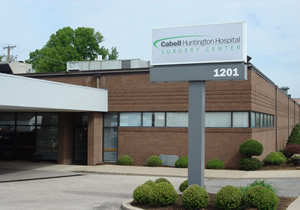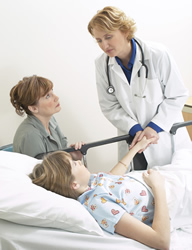The CHH Surgery Center
 Located across the street from the main campus, the Cabell Huntington Hospital Surgery Center (CHHSC) specializes in a wide range of outpatient, same-day surgical procedures, offering the same fully equipped facilities and technology as the hospital, but in a smaller, more intimate setting. Please review the information below about having surgery at the Cabell Huntington Hospital Surgery Center.
Located across the street from the main campus, the Cabell Huntington Hospital Surgery Center (CHHSC) specializes in a wide range of outpatient, same-day surgical procedures, offering the same fully equipped facilities and technology as the hospital, but in a smaller, more intimate setting. Please review the information below about having surgery at the Cabell Huntington Hospital Surgery Center.
Preparing for Surgery at the Cabell Huntington Surgery Center— Let's Get Started!
Registering for Surgery
 To expedite your admission process, the pre-operative nurse will call you prior to your surgery to review information about your health and answer any questions you may have. If you use sign language or need assistance reading and/or speaking English, please let the nurse know if you need help arranging for an interpreter.
To expedite your admission process, the pre-operative nurse will call you prior to your surgery to review information about your health and answer any questions you may have. If you use sign language or need assistance reading and/or speaking English, please let the nurse know if you need help arranging for an interpreter.
You will also be contacted by our pre-registration associate to confirm demographic and insurance information and notify you of your estimated co-pay, co-insurance and/or deductible due the day of service.
If you are not contacted by someone from CHHSC by noon the day before to your surgery, please call us at 304.523.1885 and ask to speak with both pre-registration and the pre-operative nurse.
The Evening Before & the Morning of Your Surgery
To prevent delay or cancellations, it is very important that you follow the guidelines below.
Fasting: As a safety precaution, you must fast the night before surgery. This means you cannot drink or eat anything after midnight, including water, coffee, cigarettes, chewing tobacco, chewing gum and breath mints.
Medication: Please follow the instructions given by the nurse during your phone call about what medications to take before surgery.
Grooming: Do not wear any perfume, makeup, deodorant, lotion or baby powder to the Surgery Center. Also, do not shave the area that will be operated on. Doing so can increase your chance of developing a surgical site infection. Feel free to brush your teeth, but remember not to swallow any water in the process. Be sure to wear comfortable shoes and loose, casual clothing.
Driving: Do not plan to drive yourself home or use public transportation after your procedure. Please make arrangements for a responsible adult to drive you home and stay with you for 24 hours after your surgery.
What to Bring: To help reduce anxiety, pack a small bag the night before your surgical procedure. In general, it is best to bring only the items you know you'll need and leave all valuables at home. The list below may be helpful in deciding what to pack.
Be sure to bring:
- A responsible adult to drive you home
- Your photo identification or driver's license
- Medicare and/or insurance card and co-payment for registration
- Any paperwork your doctor has given you, like permits and lab orders
- Your estimated co-pay, co-insurance and/or deductible
- Your living will and advanced directives
- Any medications that the nurse asked you to bring
- Your eyeglasses, contact lenses, hearing aids or dentures, with storage case
Please leave these at home:
- jewelry
- credit cards
- valuables
- wallet/purse
- car keys
If you brought these items with you, please give them to a family member or friend to keep until you return home.
The Day of Surgery
Check-In
When you arrive at CHHSC, please check in at the registration desk to verify personal, escort and insurance information. Also at this time we will collect your estimated co-pay, co-insurance and/or deductible and complete the registration process.
Following Admission
After checking in, you will be brought to the pre-operative holding area, where the pre-operative nurse will do a health interview and prepare you for surgery. An anesthesiologist will come in to discuss your anesthesia with you and answer any questions you may have.
- Pediatric Patients Parents/guardians may stay with a child throughout the process.
- Adult Patients: At your request, a family member will be escorted to the bay to keep you company. Only two people will be allowed to stay with you in the pre-operative holding area and the recovery area.
 When it's time for surgery, you will be escorted to the operating room, and your family or companion will stay in a waiting area until you are moved to the recovery area after surgery.
When it's time for surgery, you will be escorted to the operating room, and your family or companion will stay in a waiting area until you are moved to the recovery area after surgery.
After Surgery
Once you are in stable condition, meet the discharge criteria, and have a physician's order for discharge you will be discharged. Most patients are discharged from the CHHSC 20 to 90 minutes after surgery, depending upon the procedure. Because it is normal to experience sleepiness and dizziness for 12 to 24 hours after surgery, you must have a companion stay with you up to 24 hours after your anesthesia was administered. You will receive verbal and written post-surgical care instructions, and it is important that you follow them. The responsible adult accompanying you must be available to discuss and sign these instructions before you will be allowed to go home. If you experience anything unusual after your surgery, please call your surgeon or go to the nearest emergency room. A nurse from the Surgery Center will call you within a few business days to check on your recovery.
